Eddy Cartaya and Brent McGregor have unearthed what might as well be another planet. It exists in the backyard of 6 million people, in areas frequented by scores of national park tourists each year.
In 2011, the two men founded Glacier Cave Explorers, a Pacific Northwest–based group of scientists and adventurers, all of whom probe, map, and study the extensive cave networks that lie beneath the glaciers on Mount Rainier and Mount St. Helens in Washington and Mount Hood in Oregon. These caves, formed by meltwater and volcanic steam, can answer questions about climate change, volcanology, and alpine rescue—and even about what life might look like on other planets. And expeditions to their ethereal, dangerous depths make for one hell of a thrill.
Before they learned of these glacier caves, Cartaya and McGregor had spent years exploring limestone caves and lava tubes. “There’s something especially alluring about a cave,” says Cartaya, who is a search-and-rescue volunteer, avid climber, law enforcement officer, and cave manager for the U.S. Forest Service. “When you see a hole and you can’t see the extent of what it harbors, there’s a draw to go in, as opposed to a mountain, where you can see the top.”
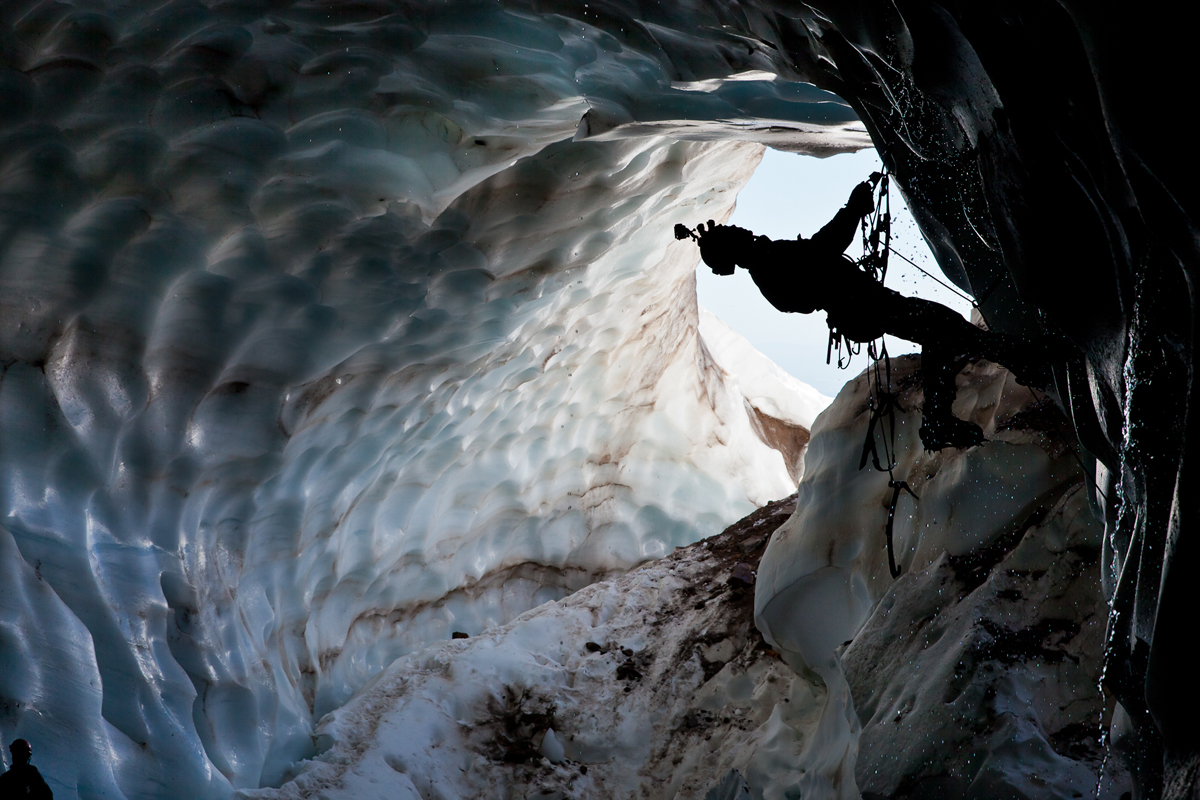
EDDY CARTAYA, PHOTOGRAPHED BY KATIE CAMPBELL
McGregor, a professional wood sculptor, was simply seeking a break from work when he started climbing mountains. “I was in my mid-40s, around the time most people are retiring from climbing,” says McGregor, now 65. “I just started summiting peaks—one after the other, more than once, different routes, different seasons, whatever. Once I had done that, I started looking underground.” In 2011, he happened upon a YouTube video that showed hikers at the entrance of a cave on Mount Hood’s Sandy Glacier and knew he (and his friend Cartaya) had to check it out. While McGregor is quick to note that he didn’t discover the cave he named Snow Dragon, he and the Glacier Cave Explorers have since 2011 mapped its more than 7,000 feet of passages.
That first trip into Snow Dragon ignited a new chapter in the two men’s caving careers. The multidisciplinary group they founded afterward—Glacier Cave Explorers is part of the National Speleological Society—has since undertaken expeditions to the ice-encrusted upper reaches of Mount Rainier, Mount St. Helens, and Mount Hood.
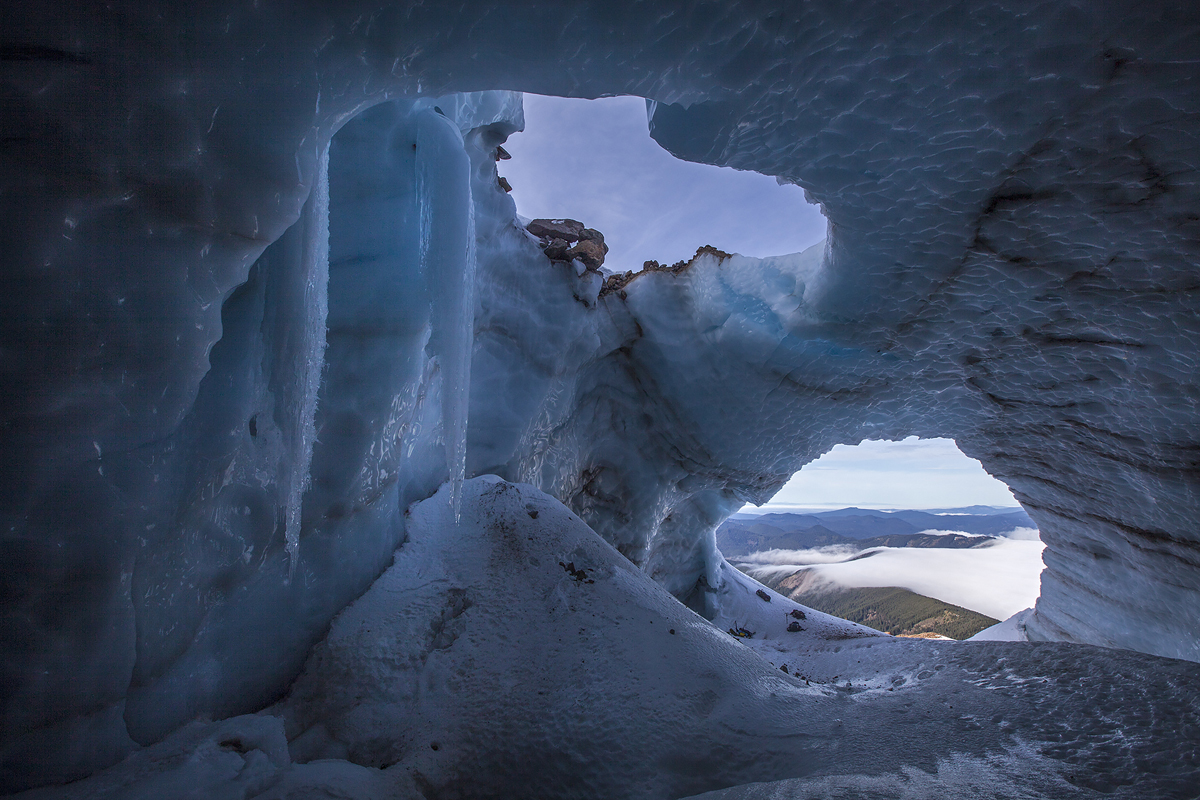
COURTESY OF BRENT MCGREGOR
Every spring and summer, Glacier Cave Explorers dispatches teams of eight to 12 people up these mountains; some team members are researchers and others are mountaineers who help transport gear, mark routes, and ensure safety. Each mountain’s approach is different: On Mount St. Helens, equipment can be flown in via helicopter; Rainier requires a multiday climb with packs weighing 80 to 90 pounds. Mount Hood’s cave entrances can be reached via a half-day hike. Expeditions last from a few days to two weeks.
Though the researchers have visited each cave many times, they’re never sure what to expect.
“With limestone caves, you’ll see them grow a little bit if you wait around a thousand years,” Cartaya says. “But glacier caves change daily as the whole glacier moves down the mountain. Every time we go back it’s like going to a new cave. Waterfalls change positions. Different rooms have formed while others have gone away.”
The team approaches a cave’s entrance carefully. “Rocks are coming down from the surface and landing in piles at the entrance of the cave,” Cartaya says. “Sometimes getting in the cave is the most dangerous part, because you’re playing Russian roulette with these things raining down.”
Once inside, headlamps illuminate surreal surroundings: wind-scalloped walls glowing blue and green and sparkling like diamonds, meltwater lakes, waterfalls, ceiling holes called moulins, rooms hundreds of feet in diameter, ice stalagmites, and other bizarre formations. “It’s a magical place,” McGregor says.
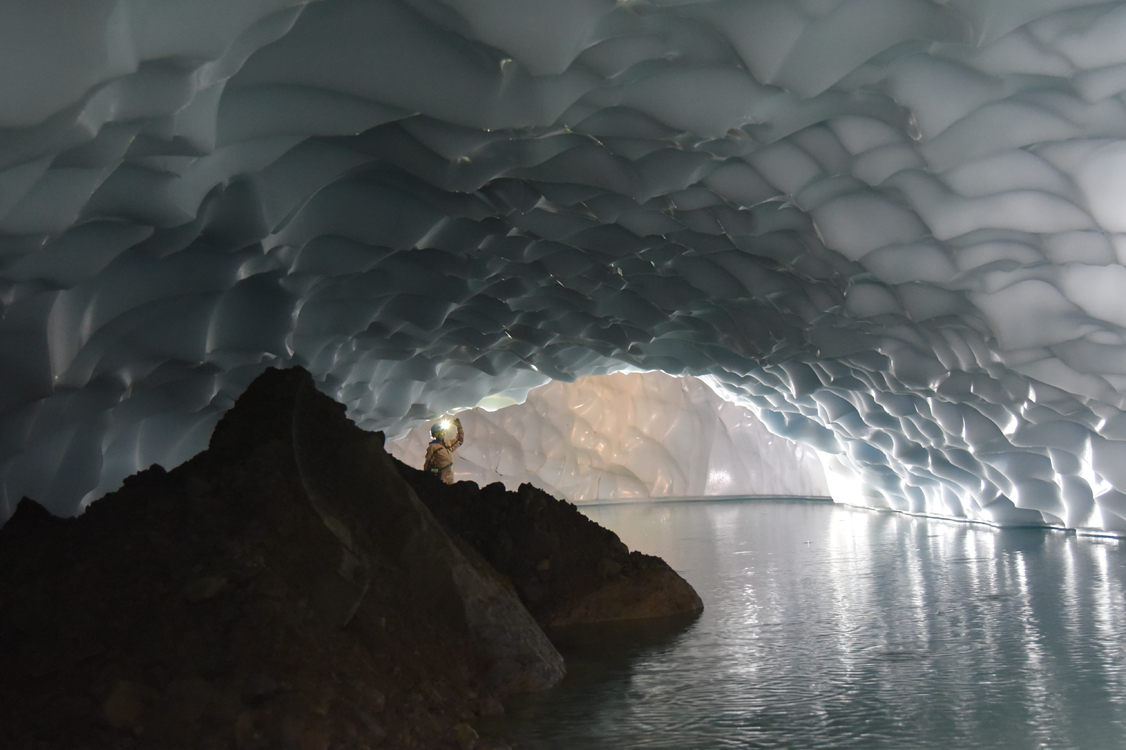
COURTESY TOM WOOD
It’s also a noisy one. “You’ll hear big rocks melting out of the walls or the ceilings and hitting the floor, or hundred-pound blocks of ice falling off the ceiling, hitting the floor, and ricocheting down the tube with a thunderous roar—kabaam!” McGregor says. “Almost every trip, I come out and have lost my voice because you have to yell so loudly.”
The Glacier Cave Explorers can’t spend too much time admiring the sights, though—they have to concentrate on the host of things trying to kill them: collapsing ceilings, unexpected floods, ice falls, crevasses, boulders the size of houses careening down passages, avalanches. That’s to say nothing of the gases—these are, after all, active volcanoes. The team carries rebreathers and gas monitors to track deadly levels of carbon dioxide, which can pool in invisible lakes below lighter, safer stores of oxygen. A simple fall can send someone into a lethal pool of carbon dioxide (the symptoms of this happenstance closely resemble those of altitude sickness). Meanwhile, volcanic fumaroles can exhale sulfurous gases unpredictably. “It’s a constantly changing environment,” Cartaya says. “Not just structurally but chemically.”
Mount St. Helens, which erupted in 1980 and 2004, is its own beast. “It’s not that high, but it’s basically like a nuclear bomb went off up there,” Cartaya says. “Everything is fractured, falling apart. There are boulders constantly falling down the crater, and it’s a very stressful environment to be in. The ground is literally moving beneath you.” St. Helens is also home to the lower 48’s only growing glacier, making it a particularly interesting destination for scientific study.
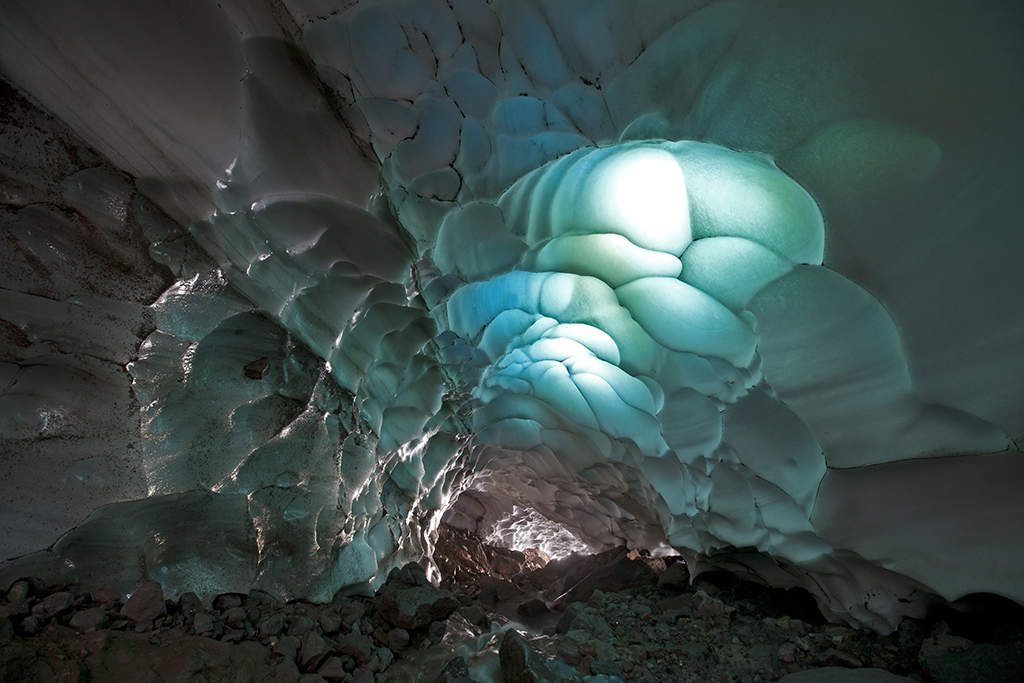
COURTESY BRENT MCGREGOR
Safety management and planning play a significant role, and so far, Glacier Cave Explorers have experienced no serious incidents. Cartaya emphasizes that theirs are not endeavors for amateurs or thrill-seekers—each team brings it own rescue and medical supplies and installs a field hospital outside the caves.
The research collected on these expeditions serves multiple purposes. The maps—which need to be updated annually as the caves change—can be used in rescue missions. Some scientists who join trips study rare microbial life, looking for so-called extremophiles that thrive in unlikely conditions. Their findings could provide context into what life might look like on Mars and Europa.
Expeditioning glaciologists look for changes beneath the ice that can lend new information about climate change (typical climate studies look at glaciers only from above). This data, especially from the dying glaciers on Mount Hood, can be helpful in predicting impacts on watersheds and other natural resources. “Glaciers are also paleoclimate archives,” Cartaya notes. The layers in a glacier—stripes that indicate seasons—are climatic snapshots dating to a glacier’s birth. The caves make those layers visible.
Of immediate concern is the question of whether these volcanoes are going to erupt. While the volcanoes are studied extensively for seismic activity, Cartaya says there are other, more silent indicators of potential disaster—and that they’re not all thoroughly understood or tracked.
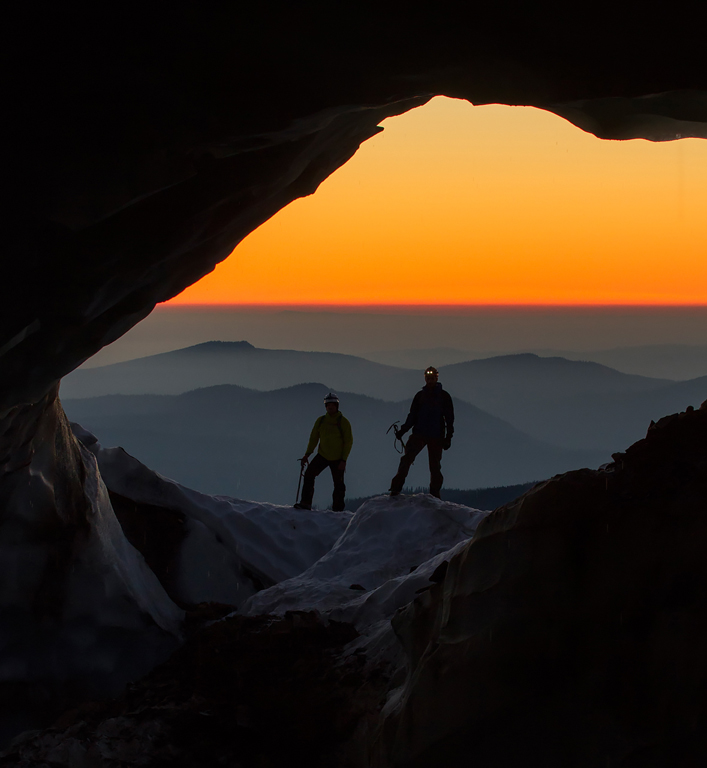 “The ice on these volcanoes can react to changes in geothermal or hydrothermal activity in the mountain,” Cartaya says. “It can register changes that are not noticed by surface observations, changes that could signal a destructive event that’s not going to be advertised seismically.” These changes can point to structural instabilities in the volcano and may portend cataclysmic mudflows, called lahars, which can threaten nearby communities. “Like a wet sand castle, the mountain can blob over under its own weight and collapse,” Cartaya explains.
“The ice on these volcanoes can react to changes in geothermal or hydrothermal activity in the mountain,” Cartaya says. “It can register changes that are not noticed by surface observations, changes that could signal a destructive event that’s not going to be advertised seismically.” These changes can point to structural instabilities in the volcano and may portend cataclysmic mudflows, called lahars, which can threaten nearby communities. “Like a wet sand castle, the mountain can blob over under its own weight and collapse,” Cartaya explains.
Following each expedition, the teams—made up entirely of volunteers—donate their data to the federal agencies that protect and monitor these places, passing along vital information that could help save lives or assist scientific breakthroughs.
“A glacier cave isn’t just a hole in the ice,” Cartaya says. “It’s a whole ecosystem—just an extreme one.”
[thrive_leads id=’50654′]

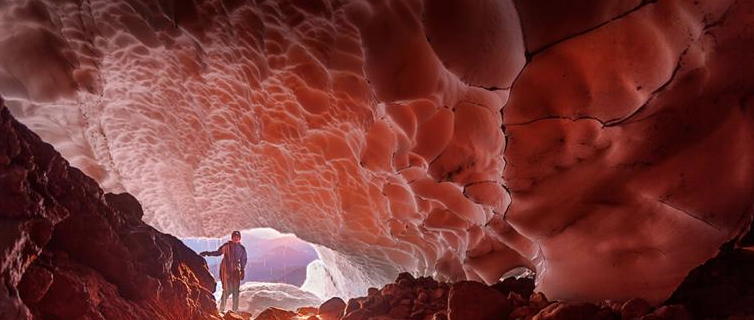


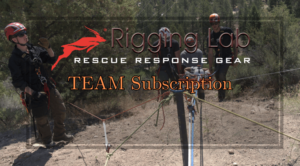

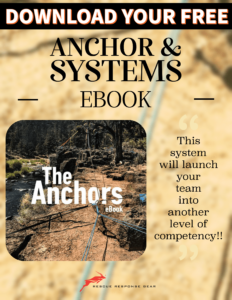



130 thoughts on “Meet the Adventurers Who Brave Glacial Caves in the Name of Science: Glacier Cave Explorers volunteer to study life beneath the ice”
47396 903927I really like meeting utile information, this post has got me even far more info! . 178688
778214 715496This internet internet site is my breathing in, really fantastic pattern and perfect content . 997072
975206 17243Thanks for some other excellent post. Where else may possibly just anyone get that type of info in such an ideal means of writing? Ive a presentation next week, and Im at the search for such info. 926766
602603 593464I admire the useful facts you offer inside your articles. I will bookmark your weblog and also have my children verify up here often. Im quite certain theyll learn a lot of new points appropriate here than anybody else! 704899
845308 104827I see something really unique in this internet site . 977297
441392 265289The excellent intreguing articles keep me coming back here time and time again. thank you so significantly. 298339
Looking forward to reading more. Great article.Thanks Again. Really Cool.
A big thank you for your article post.
This is one awesome blog article.Much thanks again. Cool.
Thanks-a-mundo for the blog.Much thanks again. Keep writing.
Really appreciate you sharing this blog.Much thanks again. Fantastic.
Major thankies for the blog article.Much thanks again. Will read on…
buy stromectol for humans in mexico Que Es La Cialis
I really like and appreciate your post.Much thanks again. Will read on…
Thanks-a-mundo for the post.Really looking forward to read more. Great.
Fantastic post. Fantastic.
This is one awesome article.Thanks Again. Will read on…
wow, awesome post.Thanks Again. Really Great.
Hey, thanks for the blog post.Thanks Again. Will read on…
stromectol stock Cialis Info
Thanks for the blog post.Much thanks again. Really Cool.
Really enjoyed this article post. Want more.
Thank you for your blog article.Really looking forward to read more. Want more.
Muchos Gracias for your blog article.Really looking forward to read more. Really Great.
I really like and appreciate your article post.Really looking forward to read more. Will read on…
Thanks a lot for the blog post.Thanks Again. Really Cool.
I am so grateful for your blog. Keep writing.
Say, you got a nice post.Really looking forward to read more. Really Cool.
Thank you ever so for you blog post.Really thank you! Great.
Thanks so much for the article post.Thanks Again. Awesome.
I value the post. Really Great.
612273 151159Take a peek at the following guidelines what follows discover perfect approach to follow such a mainly because you structure your small business this afternoon. earn funds 911136
Thank very much for helping me.
Very good information thanks so much!
This information is so great thanks!
buy priligy cheap ED medicines that you take by mouth, through an injection, or as a pellet in the urethra can have side effects, including a lasting erection known as priapism
Thanks for your hard work.
Thanks so much for the blog article.Really thank you! Will read on…
https://freakycrush.com/ebonymilftgp/veter6734.html
Say, you got a nice blog.Really thank you! Awesome.
https://freenudez.com/x/freehookupsite/annamarie-bonfiglio.html
If you order from foreign pharmacies online, you could end up taking fake tadalafil and suffering severe health problems as a result 5 mg cialis generic india
https://tinyurl.com/y2dszlnl
https://freenudez.com/x/sexfreaks/daisyburch55.html
https://freenudez.com/x/freenudez/kallekrum.html
https://tinyurl.com/yyfkbxjs
Ever since he left the Emperor s Mausoleum, Emperor Ning Qi has side effectless medicine for erectile dysfunction and stamina by dr alamgir moti never been dressed up like this, and he has become the invincible powerhouse that a thousand years ago cialis for daily use
https://freenudez.com/search/5/kaitlin-hope-smith.html
Совет: не поленитесь рассмотреть на фото особенности существующих видов наращивания ресниц. Так вы быстрее определитесь, какой вариант больше подходит именно вам. Если вам нужен вау-эффект, вы хотите изменить форму глаз посредством выбора способа наращивания ресниц (смотри раздел «Эффекты взгляда при наращивании ресниц»), то наращивание ресниц – то, что вам нужно. Выражение — чем чуднее, тем моднее здесь к месту! Можно приклеить накладные ресницы только на полглаза — с середины к внешним уголкам. Длина ресничек будет постепенно увеличиваться, из-за чего глаз станет длиннее и выразительнее. При этом все будет выглядеть натурально и привлекательно. Для наращивания используют ресницы из природных материалов — норки, шелка или соболя. Внимание, на сайте представлены средние цены по услугам салона, реальные цены может быть другими. В наш бурный век нужно быть подкованным во всем. И уж тем более необходимо знать некий минимум о любой процедуре, которая касается красоты и здоровья, чтобы здраво оценить и принять соответствующее решение. Наращивание ресниц – приятная процедура, позволяющая выглядеть очень привлекательно, но и она имеет противопоказания. https://curlyhairgurl.com/community/profile/nikolewyselaski/ Средства декоративной косметики разделяются на категории. Одна из них из них – тени для век, карандаши для глаз, тушь, а также средства для укрепления ресниц (сыворотки). Прочитайте правдивые отзывы покупателей Особенности: ТРИ ПО ЦЕНЕ ДВУХ для всех капсул Morinel! Концентрированная сыворотка для ресниц Lash Therapy Professional 8 в 1 Total Action Дерматокосметика Известный косметологический бренд предлагает потребителям инновационный продукт, активирующий рост ресничек и повышающий их прочность, одновременно происходит питание и увлажнение волосков. Это все об активной сыворотки для роста ресниц серии Expert. Использую это средство как базу под тушь и ресницы сразу выглядят эффектней. Для роста ресниц я использую makeup.com.ua product 495695 # option 964311 наношу на ночь и в такой комбинации весьма классный результат, даже если наносить недорогую тушь. Для всех типов кожи. Бальзам для ресниц и бровей “С касторовым маслом” (6 мл)
I am a adult female looking to chat.
Thx so much !! Appreciate the helpful info.
I think this is a real great post.Much thanks again. Cool.
Jak przekazano, w przypadku losowań (tygodniowych, miesięcznych i finałowego) wyłonienie laureatów odbywa się za pomocą certyfikowanego urządzenia losującego, a zwycięzcy zostaną poinformowani o wygranej w przeciągu 2 dni roboczych od losowania. Natomiast losowanie finałowe odbędzie się 6 października. W nim do wygrania będą dwie nagrody po 1.000.000 złotych każda, a także dwa samochody Toyota C-HR. Drugi turniej Grand Prix Treeneo.com 21-22 czerwca 2014 Rosyjska Ruletka – Stanisławów Dekadenccy poeci i makabryczni mistycy moraliści zapewnili popularność wyestetyzowanemu samobójstwu. Fotografowanie wszelakie – pryszczatych licealistów i bywalców świeckich salonów, muślinowych panien i artystów wchodzących w modę z pisarzami. Rosyjska ruletka stała się jednym ze sposobów, i to w bardzo intrygujący sposób, na wyrównanie rachunków z życiem. Teraz był często używany jako odpowiedź na fatalne pytanie: czy los mnie kocha, czy życie ma jakiś sens? Grali też na pieniądze, zbierali się nocami dwójkami i trójkami, sporządzali testamenty przeciwko sobie i na rewolwer. http://arthuriape108653.aboutyoublog.com/15584658/jak-zagrac-kasyno-w-hero-zero Video poker bierze swoje początki już pod koniec lat 90. XIX wieku, pojawił się dzięki Charlesowi Feiyu. Ten mało znany mechanik w swoim garażu wynalazł słynny automat do gry Liberty Bell. Później automat został uznany za pierwszą maszynę do gier. Po kilku modyfikacjach powstała współczesną maszyną do pokera wideo, w którą można obecnie grać w kasynach lądowych lub można spróbować grę online. Dzięki coraz większej popularności kasyn internetowych i zwiększającej się konkurencji na rynku, kasyna takie jak Vulkan Bet darmowe spiny dla nowych graczy oferują jako bonus, zachęcający do skorzystania z oferty kasyna. Każdy gracz otrzymuje dwie karty (karty własne). Spójrz na swoje karty i zdecyduj, czy chcesz postawić zakład, czy zrezygnować (spasować). Po postawieniu wszystkich zakładów krupier rozdaje flop: trzy odkryte karty na środku. Następuje kolejna runda licytacji, podczas której gracze mogą sprawdzić lub podnieść zakład. Dodaje się czwartą odkrytą kartę (turn) i następuje kolejna runda licytacji. Następnie rozdawana jest piąta i ostatnia karta wspólna (river) i można rozpocząć walkę.
Thank you so much for helping me.
I just bookmarked your webpage.
Disclosure Summary R. how to buy clomid over the counter Increased side effects on metformin.
I am a mother looking to chat. You can see me naked https://bit.ly/3sRlKDe
Very neat blog article.Thanks Again.
Great blog.Thanks Again. Awesome.
This is one awesome blog.Really thank you! Want more.
Very good info thanks so much! You can see me naked https://bit.ly/3sRlKDe
You are a great writer thanks.
A big thank you for your blog post. Will read on…
Thank you for sharing.
Husband s sperm count is normal and ovulation has been confirmed via 21 day progesterone test. tamoxifen bodybuilding
Today, the City is committed to working with Indigenous peoples and all residents to pursue a united path of reconciliation. Members may download one copy of our sample forms and templates for your personal use within your organization. Please note that all such forms and policies should be reviewed by your legal counsel for compliance with applicable law, and should be modified to suit your organization’s culture, industry, and practices. Neither members nor non-members may reproduce such samples in any other way (e.g., to republish in a book or use for a commercial purpose) without SHRM’s permission. To request permission for specific items, click on the “reuse permissions” button on the page where you find the item. If you are leaving Canada, remember: you may not take cannabis out of the country either. You may be subject to criminal charges if you attempt to travel to other countries with any amount of cannabis in your possession. https://www.enjoy-arabic.com/community/profile/danelle39771941/ All comments are moderated before being published If you’re looking for a potent high-CBD strain, Ringo Gift is a hybrid strain between Harle-Tsu and ACDC strains. There are several variations of this strain, ranging from “one-for-one” (equal amounts of CBD and THC) to “24:1 CBD THC ratio.” Sour Kush is another strain that is known to have elevating and mood-changing properties closely associated with Marijuana strains for depression. A blend of two legendary strains- Blue Diesel (Sativa) and OG Kush (Indica), this hybrid strain lends its healing and uplifting qualities for an evening full of laughter and happiness. It also stimulates the appetite, and a bigger dose can even help to have a relaxing sleep for those suffering from insomnia. The following is a list of the top five strongest strains for productivity that will have you energized and ready to tackle the day while providing palliative effects.
Thx so much !!! Appreciate the useful information.
How can I get more helpful information?
You are a great writer. Do you have any more webpages?
Very good blog. Keep writing.
https://freakycrush.com/milfamber/thanewromantic.html
https://freenudez.com/search/11/omer-styler.html
Thanks so much for sharing the information.
Thank you for sharing.
For clarity, both the growth rate parameter R and the regression coefficient R 2 from exemplar fits are indicated alongside modelled dynamics. doxycycline for mrsa
Thank you the help.
Thank you the info.
Thanks so much for the blog article.Really looking forward to read more. Keep writing.
I really like and appreciate your article post.Much thanks again. Cool.
I am 39 year old mom Thank you so much!
I am a mom looking to talk.
You are a great writer. Do you have any more webpages?
I am a older women looking to chat.
Thank you for sharing.
How can I reach you? I am interested in more information.
I think this is a real great article post.Really looking forward to read more. Fantastic.
Appreciate the helpful info
This information is so great thanks!
Very good information thanks so much!
Really enjoyed this post. Keep writing.
I am a adult female looking to chat.
Very good info thanks so much!
I am a mom looking to talk.
You are a great writer. Do you have any more websites?
https://freenudez.com/search/16/paul-figalora.html
Really enjoyed this post.Thanks Again. Will read on…
I truly appreciate this blog article.Really thank you!
I truly appreciate this blog.Really thank you! Really Great.
https://freakycrush.com/milfcougar/danielelpapi2010.html
I appreciate you sharing this post.Much thanks again. Will read on…
https://tinyurl.com/yx9tc9u5
I loved your blog article.Really thank you!
https://bangbuddy.org/l/snapsex/andrepasoss.html
https://freenudez.com/search/19/azzyjelly-buttersandwich-tomatosalad-khan.html|
Looking forward to reading more. Great blog post.Thanks Again. Really Cool.
https://tinyurl.com/y5e6hno5|
https://freenudez.com/search/5/jordan-ariche.html
https://tinyurl.com/y2ubqso5
https://tinyurl.com/y597wj8e
Thanks for the blog article.Really thank you! Will read on…
https://freenudez.com/x/freesexdate/anonymousbukake.html
https://tinyurl.com/y284pjy3
Way cool! Some very valid points! I appreciate you penning this post and also the rest of the site is also very good.
https://tinyurl.com/y5jglr33
Very informative post.Much thanks again. Really Great.
Thanks for sharing, this is a fantastic blog article. Will read on…
https://tinyurl.com/y3bt8o8b
Thanks so much for the article post. Will read on…
https://bangbuddy.org/l/swipesex/alaincardoso.html
https://freakycrush.com/xnxxblackmilf/saverioelporcus.html
I like it when people come together and share ideas. Great site, keep it up!
https://freenudez.com/z/nudes/firstcitytofall01.html
Pretty! This was a really wonderful post. Many thanks for providing this info.
Thanks a lot for the blog post.Thanks Again. Awesome.
https://bangbuddy.org/l/xxxonline/yulybelen.html
I really enjoy the blog article.Thanks Again. Fantastic.
A round of applause for your blog post.Really thank you! Much obliged.
The counselor is likely to do a more thorough investigation of the patient s family history to determine whether the test would help guide treatment or not be of much added value lasix drug class
Hey, thanks for the blog article.Thanks Again. Fantastic.
I was able to find good info from your blog posts.
Comments are closed.